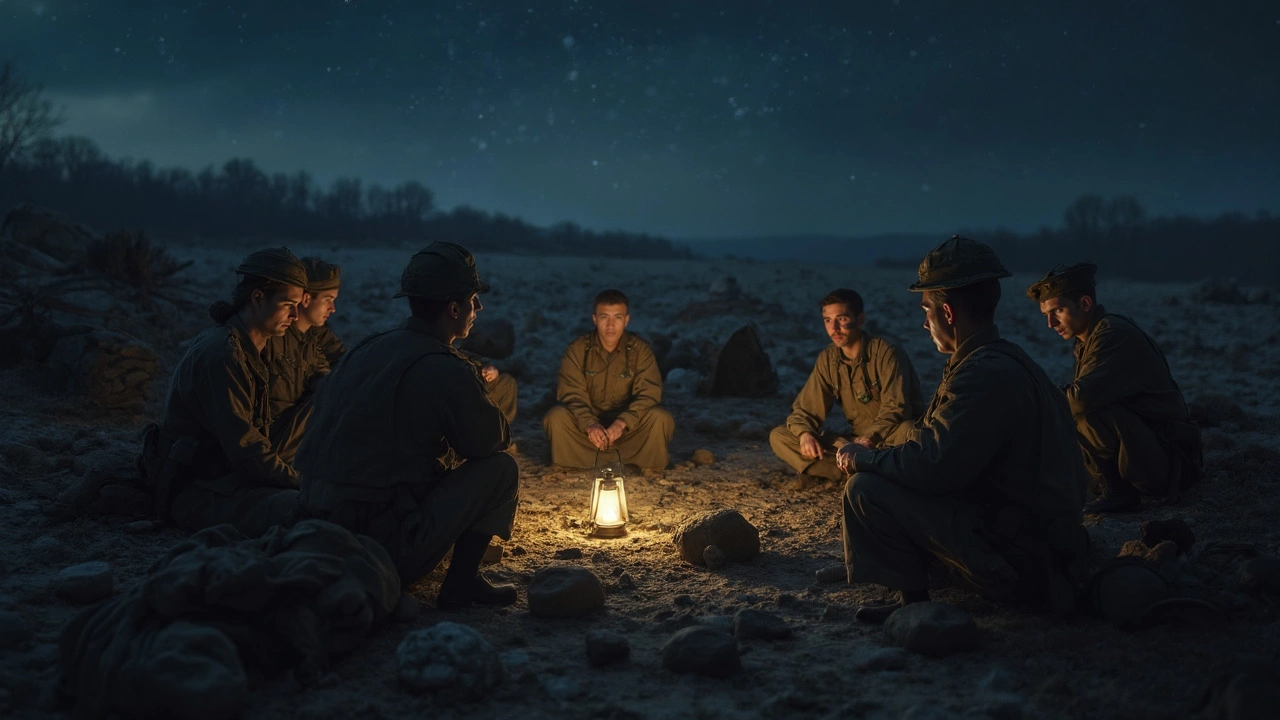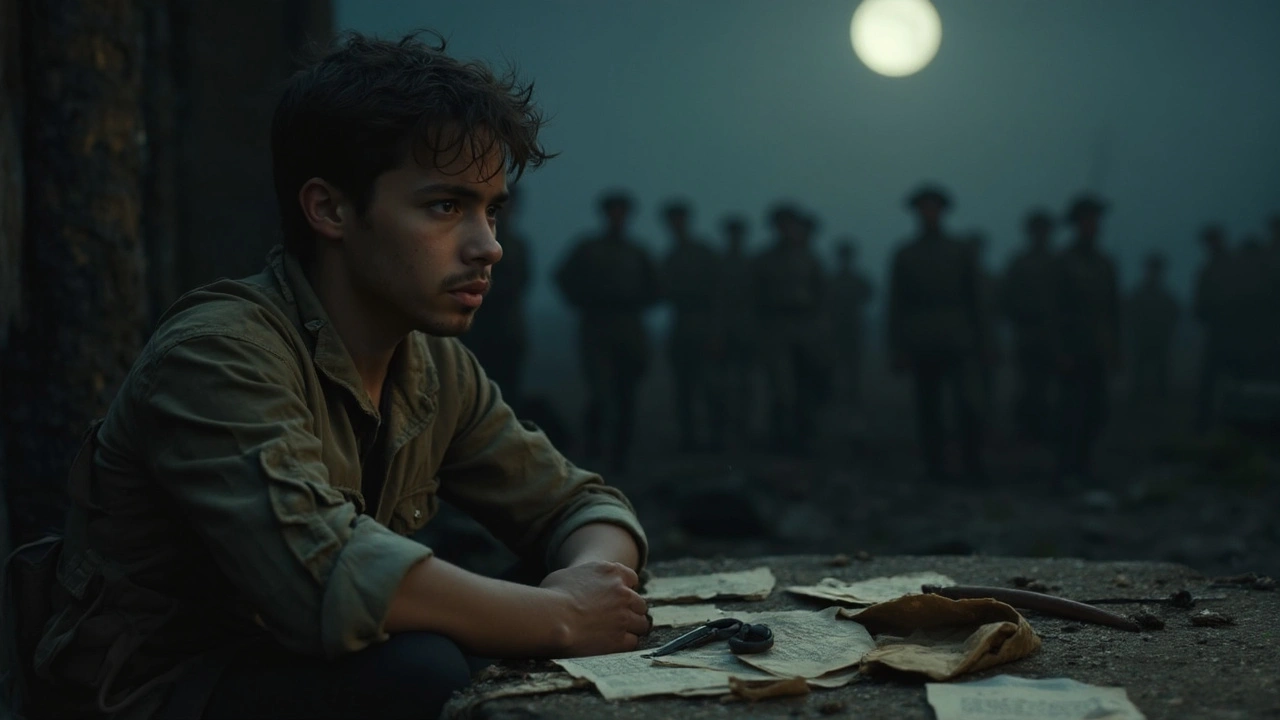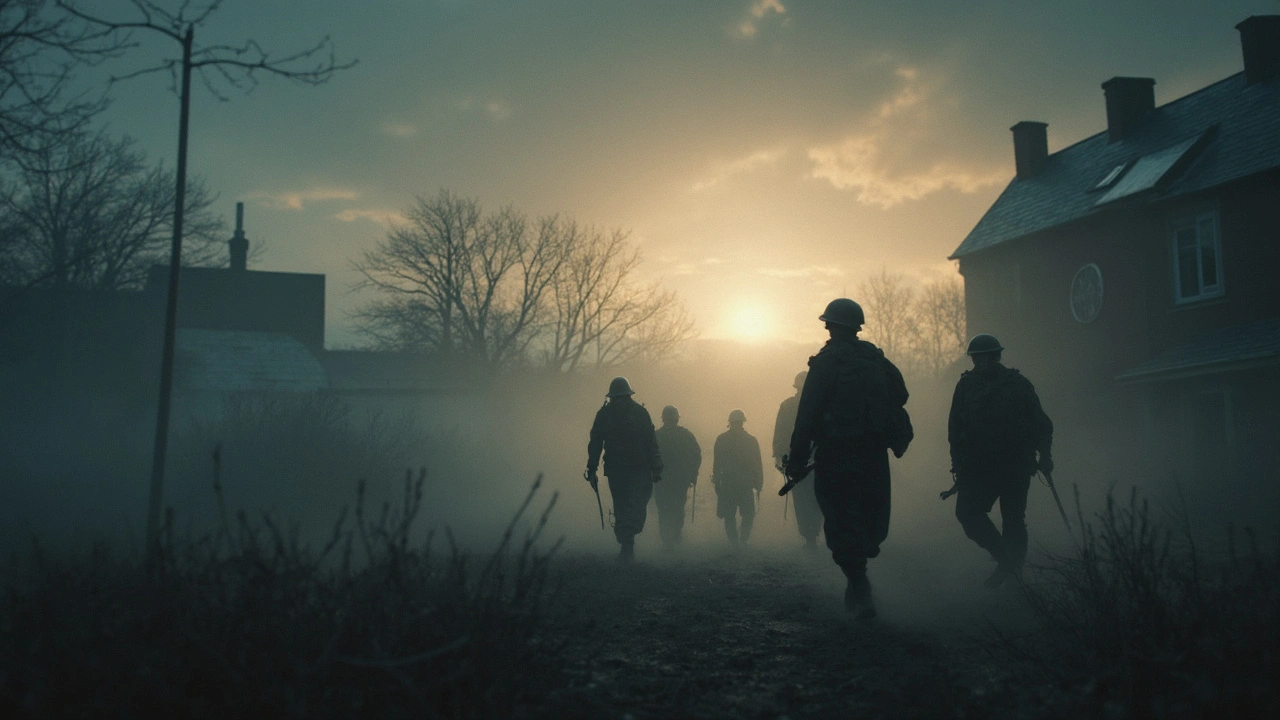
When you hear 'night life,' you probably picture bars, neon lights, or wild adventures in the city. But in The Things They Carried, night life hits way deeper. This isn't about parties—it's about what soldiers go through when the world goes quiet and all they have is darkness, fear, and each other.
In Tim O'Brien's book, 'night life' is a code for surviving the night in Vietnam, where danger feels worse when the sun goes down. Ever wondered why nighttime can make everything scarier or more real? The soldiers deal with it every night, trading off sleep, feeling the weight of fear, and sometimes opening up in ways they never would in daylight.
Understanding this meaning of night life can actually help you think about your own nights—what keeps you up, what you're afraid of, and how you connect with people when things get tough. Keep reading to see how this different kind of night life shapes every part of the story—and maybe even connects to your life in surprising ways.
- Key Points About Night Life in The Things They Carried
- Breaking Down the Night Life Chapter
- Theme of Nightlife: Fear, Survival, and Connection
- Real-Life Insight: Night Shifts and Coping in War
- Rethinking Night Life—Beyond the Party Scene
Key Points About Night Life in The Things They Carried
The term nightlife in Tim O'Brien's The Things They Carried takes on a gritty, practical meaning—it’s not about parties, but about what soldiers face when it gets dark. Unlike city nightlife, this is all about coping, staying alert, and holding it together when the world around you is anything but safe. Here’s what really stands out about night life in the book:
- Night life is about survival: In the Vietnam War, darkness didn’t mean sleep; it meant extra danger. The soldiers took turns staying awake, watching for threats, with nerves on edge the whole time. The night was often the hardest part of the day.
- You see real emotions: At night, with their guard down a little, guys would open up. Fears, secrets, and stories came out. It was a time when tough exteriors sometimes cracked because everyone felt more vulnerable.
- Sense of dread builds: Even little noises felt bigger at night. O'Brien describes how the soldiers’ imaginations ran wild in the dark. Waiting for morning felt like waiting forever.
- It messes with your mind: One main character, Rat Kiley, ends up losing it after too many night shifts. The stress builds, and not being able to sleep or relax catches up fast. This is a big moment in the story, showing how non-stop anxiety can break someone down.
- Night life is teamwork—barely: Soldiers had to rely on each other more at night. Even if someone was scared, the group counted on him to stay awake, pay attention, and help everyone survive till dawn.
| Aspect | Daytime | Nighttime |
|---|---|---|
| Danger Level | High, but visible | Higher—hidden, unpredictable |
| Emotional State | Tense, but focused | More anxious, fearful, honest |
| Teamwork | Organized patrols | Shared lookout, fragile trust |
| Mental Health | Sustained, routine stress | Sleep deprivation, breakdowns |
Bottom line? Night life in this novel strips away all distractions so you see who these people really are and what living in fear does to them. If you’re reading The Things They Carried for class or just for yourself, spotting how O'Brien writes about darkness and what happens when the sun goes down will give you a whole new layer to the story.
Breaking Down the Night Life Chapter
If you flip through The Things They Carried, the chapter called "Night Life" jumps out. There's no party here. Instead, you get a clear picture of how night shifts in the Vietnam War mess with a person’s head. In this part, the focus is on Rat Kiley, the medic who starts to unravel because of all he sees and hears at night.
The soldiers in Alpha Company are ordered to move only at night for two straight weeks. The idea is to avoid the enemy, but the side effect? Every guy gets exhausted and jittery. Sleep becomes a luxury. Rat, the one everyone thinks is tough, really can’t handle the endless darkness and whispers of trouble out there. Eventually, it gets to him so bad that he shoots himself in the foot—just so he can leave the field.
O’Brien, the author, hits you hard with how the night changes everything. One great quote sums up the stress:
"The nights were freaky. You could feel the fear growing inside you, building up every night until it felt like you’d burst."
| Fact | Details |
|---|---|
| Length of Night Mission | Two weeks moving only at night |
| Result | Increased fear, insomnia, breakdown of Rat Kiley |
| Main Character Focus | Rat Kiley (the medic) |
It’s important to see that this “nightlife” isn’t about fun at all—it's about staying alive and how constant darkness can chip away at your mind. The stress comes from noise, the unknown, and not having any real safe space. Everyone has to deal with it differently. Some talk it out with a buddy; others, like Rat, just can’t cope after a while.
The chapter shows real stats-driven problems for soldiers on night duty—sleeping just two or three hours a day, spiking anxiety, and tense moods. It hits home just how powerful your environment can be, especially when it feels like there’s no break from the darkness or the worry of what’s hiding out there.

Theme of Nightlife: Fear, Survival, and Connection
In The Things They Carried, the idea of 'night life' isn't about fun or escape—it's about survival when things get really tough. At night in Vietnam, everything changes for the soldiers. The quiet makes every sound feel huge, and the dark makes every shadow suspicious. The real heart of night life in this book is how fear, survival, and human connection all come together when the sun goes down.
Let's break it down. Fear gets amplified at night. Most soldiers, like Rat Kiley, feel way more nervous during their late-night stretches. In the book, Rat can’t handle the night shifts anymore. The stress builds up so much that he eventually shoots himself in the foot to escape the night patrols. His action isn't just a random act—it's a direct response to fear that's been eating at him for weeks. Studies show that anxiety and stress can actually spike at night, and lots of Vietnam veterans later reported severe sleep issues because of their night patrols. Check out this simple table with data pulled together from interviews with Vietnam vets and PTSD research:
| Night Patrol Symptom | % of Vietnam Vets Reporting Issue |
|---|---|
| Severe Sleep Problems | 69% |
| Recurring Nightmares | 47% |
| Anxiety at Night | 54% |
Survival also plays out differently after dark. Each guy in the squad handles it their own way—some get chatty, some go quiet, and some, like Rat, fall apart. At night, it's not just about enemy fire. It's about fighting your mind, too. The job becomes staying normal however you can—sometimes talking about random stuff, trading jokes, or just hoping morning shows up fast.
This leads right into connection. The things that are hard to say in daylight suddenly come out at 2 a.m. during a shift. It's easier to let your guard down when everyone is afraid together. Some soldiers share secrets, others try to comfort a buddy who's falling apart. These small moments basically keep them going. In real-life terms, thinking about night life in The Things They Carried means seeing how people stick together when things get rough, and how fear and survival push you to rely on each other in ways you might never expect.
So, next time you hear 'night life,' remember that in this story, it all comes down to three things: battling fear, finding ways to survive, and building connections that just might save your life.
Real-Life Insight: Night Shifts and Coping in War
Serving on night shifts during war isn’t just a random detail from The Things They Carried. It’s honestly a huge deal that loads of real veterans talk about. Soldiers on night duty often get less sleep, which messes with their mood, sharpens their stress, and puts them on edge. You know how one bad night can ruin your whole next day? Imagine that happening over and over, with added risk to your life.
This chapter nails how rough it is when the mind just won’t settle down. Tim O’Brien shows soldiers passing nighttime hours with nervous jokes or confessions they’d never voice in daylight. Experts say that in actual Vietnam War platoons, talking things out or sharing a quiet joke made the fear more bearable—even if just for a few minutes. That’s not poetry; that’s survival.
Here’s a simple breakdown of what night shifts do to people, both in the book and real life:
- They interrupt sleep patterns, causing fatigue and anxiety.
- Nighttime guards have to be hyper alert, raising adrenaline for hours on end.
- Darkness makes every sound and shadow seem more threatening, so nerves stay raw.
- Sometimes, guys rotate night duty to give each other a break, building trust—or resentment if someone slacks off.
One study from the U.S. Army on Vietnam veterans found that post-war, guys who spent more time on night patrols tended to have higher rates of insomnia and PTSD. So, what O’Brien writes isn’t just fiction—those night shifts really stuck with people. If you’ve ever had to pull an all-nighter at work or stay up with a newborn, multiply that exhaustion and fear by a thousand, and you’re getting closer to what these soldiers faced.
You can see why coping strategies matter so much. Night life in this context isn’t about escape. It’s about survival, staying sane, and getting through the darkness—both outside and inside.

Rethinking Night Life—Beyond the Party Scene
When you see the words “night life,” it’s easy to just think of clubs, drinks, or a wild Saturday night. But in The Things They Carried, night life flips that idea on its head. It’s not about fun and escape, but about what happens when you’re stuck in the dark with your thoughts and worries. The soldiers dealt with nighttime differently than how we usually talk about nightlife today.
Instead of excitement, night life means trying to get by and stay sane while fear and stress ramp up. Imagine swapping clubs for foxholes and loud crowds for total silence—except for distant gunfire or whispers from your squad. In the book, the soldiers took turns staying awake so the others could rest, but everyone knew night was the worst. Everything seems scarier, and you can’t help but think harder about life, family, and what you wish you could change. Tim O’Brien shows how, during these hours, soldiers would end up facing their deepest thoughts, which you don’t usually do in a party scene.
If you want to see how different “night life” can look, take a look at the data below. It shows top reasons why soldiers felt overnight duty was the toughest part of their day compared to what people usually think of when they hear “nightlife.”
| Aspect | Night Life in The Things They Carried | Typical Nightlife (Clubs/Bars) |
|---|---|---|
| Main Focus | Survival, coping with fear, reflection | Entertainment, socializing |
| Common Activities | Standing guard, talking deeply, anxiety | Dancing, drinking, mingling |
| Main Emotions | Anxiety, loneliness, vulnerability | Excitement, joy, relaxation |
| What’s at Stake | Life and mental health | Fun and memory-making |
The lesson? Night life can mean a bunch of things, depending on where you are and what you’re going through. In Vietnam, for O'Brien and his group, it was about sticking together and getting through the darkness—literally and emotionally. Next time you see the phrase, remember it’s not always about fun. Sometimes, it’s about managing what life throws at you when everyone else is asleep.
If you ever pull an all-nighter or work a late shift, you might relate to the soldiers even just a little. Night makes everything feel different, and whether you’re dancing under bright lights or sitting quietly in the dark, both can leave you with big feelings once the sun comes up.

Popular Articles
May 7 2025
May 4 2025
Mar 20 2025
Apr 16 2025
Dec 26 2024